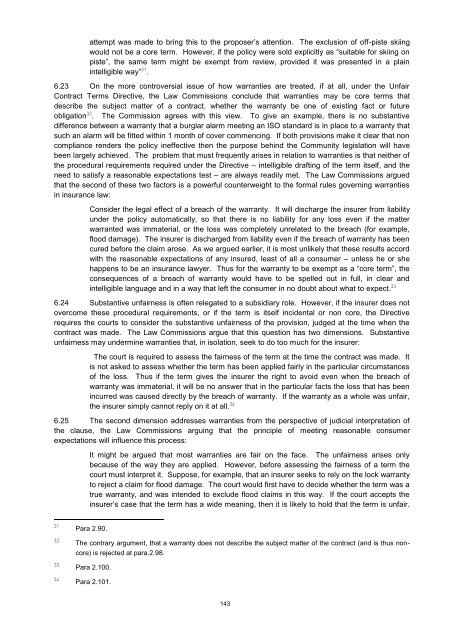Insurance Contracts CP - Law Reform Commission
Insurance Contracts CP - Law Reform Commission
Insurance Contracts CP - Law Reform Commission
You also want an ePaper? Increase the reach of your titles
YUMPU automatically turns print PDFs into web optimized ePapers that Google loves.
attempt was made to bring this to the proposer‘s attention. The exclusion of off-piste skiing<br />
would not be a core term. However, if the policy were sold explicitly as ―suitable for skiing on<br />
piste‖, the same term might be exempt from review, provided it was presented in a plain<br />
intelligible way‖ 31 .<br />
6.23 On the more controversial issue of how warranties are treated, if at all, under the Unfair<br />
Contract Terms Directive, the <strong>Law</strong> <strong>Commission</strong>s conclude that warranties may be core terms that<br />
describe the subject matter of a contract, whether the warranty be one of existing fact or future<br />
obligation 32 . The <strong>Commission</strong> agrees with this view. To give an example, there is no substantive<br />
difference between a warranty that a burglar alarm meeting an ISO standard is in place to a warranty that<br />
such an alarm will be fitted within 1 month of cover commencing. If both provisions make it clear that non<br />
compliance renders the policy ineffective then the purpose behind the Community legislation will have<br />
been largely achieved. The problem that must frequently arises in relation to warranties is that neither of<br />
the procedural requirements required under the Directive – intelligible drafting of the term itself, and the<br />
need to satisfy a reasonable expectations test – are always readily met. The <strong>Law</strong> <strong>Commission</strong>s argued<br />
that the second of these two factors is a powerful counterweight to the formal rules governing warranties<br />
in insurance law:<br />
Consider the legal effect of a breach of the warranty. It will discharge the insurer from liability<br />
under the policy automatically, so that there is no liability for any loss even if the matter<br />
warranted was immaterial, or the loss was completely unrelated to the breach (for example,<br />
flood damage). The insurer is discharged from liability even if the breach of warranty has been<br />
cured before the claim arose. As we argued earlier, it is most unlikely that these results accord<br />
with the reasonable expectations of any insured, least of all a consumer – unless he or she<br />
happens to be an insurance lawyer. Thus for the warranty to be exempt as a ―core term‖, the<br />
consequences of a breach of warranty would have to be spelled out in full, in clear and<br />
intelligible language and in a way that left the consumer in no doubt about what to expect. 33<br />
6.24 Substantive unfairness is often relegated to a subsidiary role. However, if the insurer does not<br />
overcome these procedural requirements, or if the term is itself incidental or non core, the Directive<br />
requires the courts to consider the substantive unfairness of the provision, judged at the time when the<br />
contract was made. The <strong>Law</strong> <strong>Commission</strong>s argue that this question has two dimensions. Substantive<br />
unfairness may undermine warranties that, in isolation, seek to do too much for the insurer:<br />
The court is required to assess the fairness of the term at the time the contract was made. It<br />
is not asked to assess whether the term has been applied fairly in the particular circumstances<br />
of the loss. Thus if the term gives the insurer the right to avoid even when the breach of<br />
warranty was immaterial, it will be no answer that in the particular facts the loss that has been<br />
incurred was caused directly by the breach of warranty. If the warranty as a whole was unfair,<br />
the insurer simply cannot reply on it at all. 34<br />
6.25 The second dimension addresses warranties from the perspective of judicial interpretation of<br />
the clause, the <strong>Law</strong> <strong>Commission</strong>s arguing that the principle of meeting reasonable consumer<br />
expectations will influence this process:<br />
It might be argued that most warranties are fair on the face. The unfairness arises only<br />
because of the way they are applied. However, before assessing the fairness of a term the<br />
court must interpret it. Suppose, for example, that an insurer seeks to rely on the lock warranty<br />
to reject a claim for flood damage. The court would first have to decide whether the term was a<br />
true warranty, and was intended to exclude flood claims in this way. If the court accepts the<br />
insurer‘s case that the term has a wide meaning, then it is likely to hold that the term is unfair.<br />
31<br />
32<br />
33<br />
34<br />
Para 2.90.<br />
The contrary argument, that a warranty does not describe the subject matter of the contract (and is thus noncore)<br />
is rejected at para.2.98.<br />
Para 2.100.<br />
Para 2.101.<br />
143

















